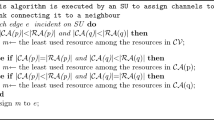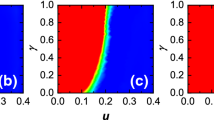Abstract
In this paper, we analyze the problem of throughput-efficient distributed coalition formation (CF) of selfish/altruistic nodes in ad hoc radio networks. We formulate the problem as a hedonic CF game with non-transferable utility and propose different preference relations (CF rules) based on individual/group rate improvement of distributed nodes. We develop a hedonic CF algorithm, through which distributed nodes may self-organize into stable throughput-efficient disjoint coalitions. We apply the concept of frequency reuse over different coalitions, such that the members of each coalition will transmit over orthogonal sub-bands with the available spectrum being optimally allocated among them. We study the computational complexity and convergence properties of the proposed hedonic CF algorithm under selfish and altruistic preferences, and present means to guarantee Nash-stability. In addition, we identify the scenarios in which a CF process might lead to instability (CF cycle), and we propose methods to avoid cycles and define different exit procedures if a CF cycle is inevitable. Performance analysis shows that the proposed algorithm with optimal bandwidth allocation provides a substantial gain, in terms of average payoff per link, over existing coalition formation algorithms for a wide SNR range.







Similar content being viewed by others
References
Umar, R., & Mesbah, W. (2014). Distributed coalition formation and bandwidth allocation in ad hoc cognitive radio networks. In IEEE vehicular technology conference (VTC) (pp. 1–5).
Bacci, G., Lasaulce, S., Saad, W., & Sanguinetti, L. (2016). Game theory for networks: A tutorial on game-theoretic tools for emerging signal processing applications. IEEE Signal Processing Magazine, 33(1), 94–119.
Myerson, R. B. (1991). Game theory, analysis of conflict. Cambridge, MA: Harvard University Press.
AlSkaif, T., Zapata, M. G., & Bellalta, B. (2015). Game theory for energy efficiency in wireless sensor networks: Latest trends. Elsevier Journal of Network and Computer Applications, 54, 33–61.
Shahid, A., Aslam, S., Kim, H. S., & Lee, K.-G. (2014). Distributed joint resource and power allocation in self-organized femtocell networks: A potential game approach. Elsevier Journal of Network and Computer Applications, 46, 280–292.
Saad, W., Han, Z., Debbah, M., Hjoerungnes, A., & Basar, T. (2009). Coalitional game theory for communication networks. IEEE Signal Processing Magazine, 26(5), 77–97.
Das, B., Misra, S., & Roy, U. (2016). Coalition formation for cooperative service-based message sharing in vehicular ad hoc networks. IEEE Transaction on Parallel and Distributed Systems, 27(1), 144–156.
Zhao, J., Chai, K. K., Chen, Y., Schormans, J., & Alonso-Zarate, J. (2015). Joint mode selection and radio resource allocation for D2D communications based on dynamic coalition formation game. In European wireless conference (pp. 1–5).
Dan, W., Yueming, C., Hu, R. Q., & Qian, Y. (2015). Dynamic distributed resource sharing for mobile D2D communications. IEEE Transaction on Wireless Communications, 14(10), 5417–5429.
Hao, X., Cheung, M. H., Wong, V. W. S., & Leung, V. C. M. (2012). Hedonic coalition formation game for cooperative spectrum sensing and channel access in cognitive radio networks. IEEE Transaction on Wireless Communications, 11(11), 3968–3979.
Saad, W., Han, Z., Basar, T., Hjorungnes, A., & Ju Bin, S. (2010). Hedonic coalition formation games for secondary base station cooperation in cognitive radio networks. In IEEE wireless communications and networking conference (WCNC) (pp. 1–6).
Saad, W., Han, Z., Basar, T., Debbah, M., & Hjorungnes, A. (2011). Hedonic coalition formation for distributed task allocation among wireless agents. IEEE Transaction on Mobile Computing, 10(9), 1327–1344.
Guruacharya, S., Niyato, D., Bennis, M., & Kim, D. I. (2013). Dynamic coalition formation for network MIMO in small cell networks. IEEE Transaction on Wireless Communications, 12(10), 5360–5372.
Saad, W., Han, Z., Basar, T., Debbah, M., & Hjorungnes, A. (2011). Coalition formation games for collaborative spectrum sensing. IEEE Transaction on Vehicular Technology, 60(1), 276–297.
Bogomolnaia, A., & Jackson, M. O. (2002). The stability of hedonic coalition structures. Games and Economic Behavior, 38, 201–230.
Niyato, D., Ping, W., Saad, W., & Hjrungnes, A. (2011). Controlled coalitional games for cooperative mobile social networks. IEEE Transaction on Vehicular Technology, 60(4), 1812–1824.
Ray, D. (2007). A game-theoretic perspective on coalition formation. New York: Oxford University Press.
Papoulis, A., & Pillai, S. U. (2002). Proability, random variables and stochastic processes (4th ed.). New York: McGraw-Hill.
Author information
Authors and Affiliations
Corresponding author
Additional information
A preliminary version of part of this work appears in Proc. 2014 IEEE Vehicular Technology Conference (VTC’14-Fall) [1].
Appendices
Appendix 1: Probability density function of \(Y_i^{\{i,k\}}\)
\(Y_i^{\{i,k\}}=\sum _{j=1,j\ne i,k}^{N}Y_{ji}\) with \(Y_{ji}\sim \beta _{ji}\exp (-\beta _{ji} y_{ji})\). For the case of \(\beta _{ji}=\beta ,~\forall ~i,j\in \mathcal N\),
\(\hat{f}_{Y_i^{\{i,k\}}}(s)=\prod _{j=1,j\ne i,k}^{N}\hat{f}_{Y_{ji}}(s)=\prod _{j=1,j\ne i,k}^{N}\frac{\beta }{s+\beta }=\frac{\beta ^{N-2}}{(s+\beta )^{N-2}}\) and hence, \(f_{Y_i^{\{i,k\}}}(\acute{y}_i)=\frac{\beta ^{N-2}}{\Gamma (N-2)}(\acute{y}_i)^{N-3}\exp (-\beta \acute{y}_i)\). For the case of distinct \(\beta _{ji},~\forall ~i,j\in \mathcal N\),
\(\hat{f}_{Y_i^{\{i,k\}}}(s)=\prod _{j=1,j\ne i,k}^{N}\hat{f}_{Y_{ji}}(s)=\prod _{j=1,j\ne i,k}^{N}\)
\(\left( \prod _{j=1,j\ne i,k}^{N}\beta _{ji}\right) \left( \sum _{j=1,j\ne i,k}^{N}\frac{1}{(s+\beta {ji})\prod _{l=1,l\ne i,j,k}^{N}\left( \beta _{li}-\beta _{ji}\right) }\right) \) and hence, \(f_{Y_i^{\{i,k\}}}(\acute{y}_i)=\left( \prod _{j=1,j\ne i,k}^{N}\beta _{ji}\right) \Big (\sum _{j=1,j\ne i,k}^{N}\frac{\exp (-\beta _{ji}\acute{y}_{i})}{\prod _{l=1,l\ne i,j,k}^{N}\left( \beta _{li}-\beta _{ji}\right) }\Big )\).
Appendix 2: Probability distribution function of \(Y_i^{\{i\}}\)
\(Y_i^{\{i\}}=\sum _{j=1,j\ne i}^{N}Y_{ji}\) with \(Y_{ji}\sim \beta _{ji}\exp (-\beta _{ji} y_{ji})\). For the case of \(\beta _{ji}=\beta ,~\forall ~i,j\in \mathcal N\),
\(f_{Y_i^{\{i\}}}(y_i)=\frac{\beta ^{N-1}}{\Gamma (N-1)}(y_i)^{N-2}\exp {(-\beta y_i)}\) which gives:
\(F_{Y_i^{\{i\}}}(y_i)=\int _0^{y_i} f_{Y_i^{\{i\}}}(\xi )d\xi =\frac{\beta ^{N-1}}{\Gamma (N-1)}\int _0^{y_i}(\xi _i)^{N-2}\exp (-\beta \xi _i)d\xi _i=1-\frac{\Gamma (N-1,\beta y_i)}{\Gamma (N-1)}\).
For the case of distinct \(\beta _{ji},~\forall ~i,j\in \mathcal N\),
\(f_{Y_i^{\{i\}}}(y_i)=\left( \prod _{j=1,j\ne i}^{N}\beta _{ji}\right) \left( \sum _{j=1,j\ne i}^{N}\frac{\exp (-\beta _{ji}y_{i})}{\prod _{l=1,l\ne i,j}^{N}\left( \beta _{li}-\beta _{ji}\right) }\right) \) which gives:
\(F_{Y_i^{\{i\}}}(y_i)=\int _0^{y_i} f_{Y_i^{\{i\}}}(\xi )d\xi =\left( \prod _{j=1,j\ne i}^{N}\beta _{ji}\right) \)
\(\left( \sum _{j=1,j\ne i}^{N}\frac{1}{\beta _{ji}\prod _{l=1,l\ne i,j}^{N}\left( \beta _{li}-\beta _{ji}\right) }\int _0^{y_i} \exp (-\beta _{ji}\xi _{i})d\xi _i\right) =\left( \prod _{j=1,j\ne i}^{N}\beta _{ji}\right) \left( \sum _{j=1,j\ne i}^{N}\frac{1-exp(-\beta _{ji}y_{i})}{\beta _{ji}\prod _{l=1,l\ne i,j}^{N}\left( \beta _{li}-\beta _{ji}\right) }\right) \).
Rights and permissions
About this article
Cite this article
Umar, R., Mesbah, W. Throughput-efficient coalition formation of selfish/altruistic nodes in ad hoc networks: a hedonic game approach. Telecommun Syst 67, 95–111 (2018). https://doi.org/10.1007/s11235-017-0323-2
Published:
Issue Date:
DOI: https://doi.org/10.1007/s11235-017-0323-2




